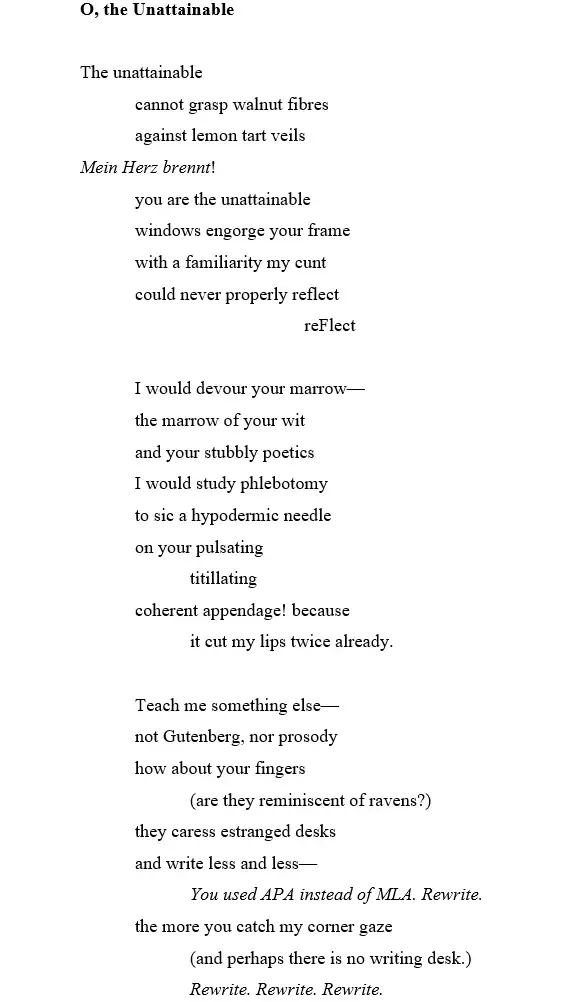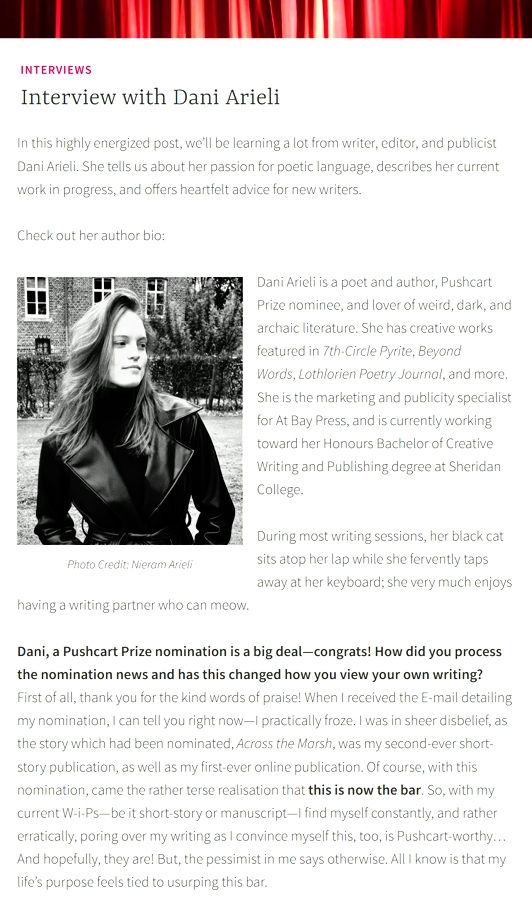The Leash of Fiction
- daniarieli
- Jun 11, 2025
- 4 min read
Updated: Jun 16, 2025
Imagination is the voice of daring. If there is anything Godlike about God it is that. He dared to imagine everything. - Henry Miller, ‘Sexus’
***
The immoral. The stain-glass prose of intrusive thoughts. The ethically unattainable.
Art allows us to indulge in these immoralities—these verbose diableries, that inviting chill down your spine, and that is precisely where poetry falls into the mix like an eerily perfected puzzle piece. An unattainable reality, for it is fiction that grounds all of us in reality; and this is funny, isn’t it? How could fiction grasp the leash of reality? For isn’t it fiction itself that opens its indulgent legs for us to escape to? Well, you may have been thinking about fiction in a far more diluted sense of the word—the concept, the art—for poetry utterly abuses this facet of literature. And it does so with implicit purpose.
Take my poem, O, the Unattainable, for example: this piece was written on a whim—though, the thought itself was not of any sort of hasty whim, I can assure you—and reads like a rather debauched love profession. Well, not to spoil the fun of literary subjectivity, but the muse of this poem is of immorality. Of course, as many writers do, I fancy ambiguity, and I will not indulge any of you further, but when we consider this poem, it is clear that the thoughts of the speaker—the poet—are insatiable, and for all the right reasons.


Like many of my writings, they are not to be enjoyed in a titillating or rousing manner, but rather, a jaw-dropping-thought-provoking silence. O, the Unattainable embodies debauched yearning; but not debauched in a Marquis de Sade fashion, but instead, a sympathetic (and maybe empathetic, depending on who you are) longing that so easily washes over much of the world’s audience. Love is hard to come by; no, it does not strike at random, and no, this is not lust—rather, a yearning that has persisted for centuries: the unattainable nature of authority. Oh, this could mean anything, yes!—and that is the titillating, the rousing, reality of fiction! There is a desire to learn, much like there is a desire to touch; and with poetry, many of these human desires can be explored. The reason regarding why an authority cannot be pursued is of little interest to me, for it is the idea that fascinates me so.
These thoughts—intrusive in nature, but also perverse in actualisation—are being walked all over the page, as the leash of fiction stalks in tow. What interests us—fascinates us, disgusts us, arouses us, all these thoughts can be monitored within the prairie of the document, with the herder being the writer; and as the herder, you always hold the leash. But with a leash, comes the decision and responsibility to loosen the leash—just how much can you allow to slip from your fingers, before you must rein the literary cord back in to your mind? How much can you really write down, before the leash must be tightened to retain your own authorial authority? Author… Authority… They sound one and the same, don’t they?
Autho(rity); what is a rity? This reminds me of Dennis Lee’s collection of poems, Testament, in which words are created for the sake of painting an implicit picture within the reader’s mind; for it is what the poem does, not how it does. A rity, in this case, could mean the author’s ritualistic lashings of their leash of fiction—pulling from the Latin word, ritus. An author-ritual. Does the writer sacrifice a part of themselves with each poem or chain of prose they release into the world? Are we, as authors, to give something to our audience—something other than the words splayed across a page: the implicit? How much do we reveal as the speaker? Do we reveal anything at all—or, as one of my university professors put it, “The poet is not always the speaker.” So, with all these facets of the author-ritual in mind, just how much does the writer sacrifice in the name of insatiety? Or, are we sated with the materialisation of our thoughts—our most esoteric day-dreams, our suppressed fears—when viewing them on the page? Does the leash still work when we tug at the manifestation of our ideas, once the stark document has grabbed hold of their fleeting necks?
Writing itself is immoral. Who are we to create our own culverts of reality, when a life has already been bestowed upon us? Are we to embrace immorality? The page certainly says yes, but the rhetorical nature of this question is what ebbs the flow of emerging and established writers. Seriously—write what you want to write. Embrace immorality on the page, coddle unethicality amid your keyboard, and tenderly concoct those intrusive thoughts into comprehensible stanzas and paragraphs. The life we were given comes with endless rules and ethics, but writing does not come pre-determined; no, it is up to you, the writer with the leash of fiction, to allow the stroke or tapping of what it is you wish to explore on the page. As we do with our bodies, words are meant to be explored; to touch with a burning curiosity, to retract with a determined steadiness, and to ponder over with an obsessive gaze.
Take hold of that leash of fiction; for it is yours to lead.


Comments